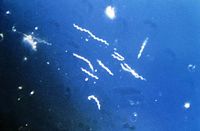Borrelia burgdorferi
Jump to navigation
Jump to search
| Borrelia burgdorferi |
|---|
| Scientific classification |
|
|
Description and significance
B. burgdorferi is a motile, two-membrane, spiral-shaped bacteria which is found mostly in North America and Europe. It's named after Willy Burgdorfer, who in 1982 isolated and determined the bacteria to be the causative agent of Lyme disease.
Genome structure
| Number | Percent | |
|---|---|---|
| Total Number of all DNA molecules: | 22 | 100.00% |
| Total Size of all DNA molecules: | 1521208 bp | 100.00% |
| Number of Primary Annotation coding bases: | 1349393 bp | 88.70% |
| Number of G+C bases: | 428672 bp | 28.17% |
| Number | Percent | |
|---|---|---|
| Total genes: | 1813 | 100.00% |
| Protein coding genes: | 1773 | 97.79% |
| Genes assigned a role category: | 915 | 51.60% |
| Genes not assigned a role category: | 111 | 6.26% |
| Conserved hypothetical genes: | 665 | 37.50% |
| Hypothetical genes: | 82 | 4.62% |
| tRNA genes: | 33 | 1.82% |
| rRNA genes: | 7 | 0.38% |
